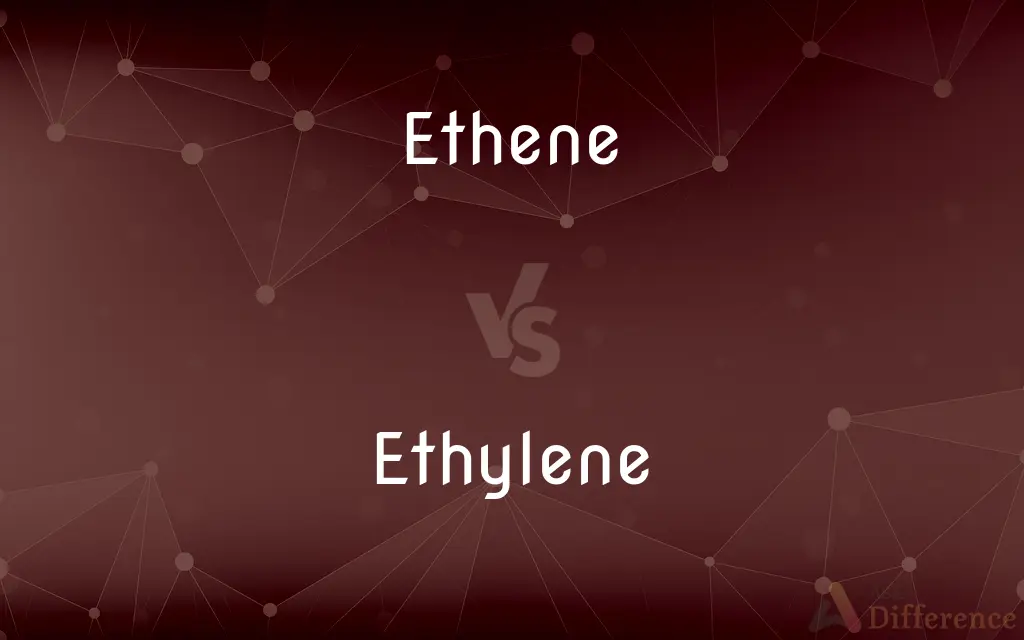Ethene vs. Ethylene — What's the Difference?
By Tayyaba Rehman & Maham Liaqat — Updated on April 4, 2024
Ethene, a key compound in organic chemistry, is primarily used in chemical synthesis, whereas ethylene, its common name, is known for its role in plant biology and industrial applications.

Difference Between Ethene and Ethylene
Table of Contents
ADVERTISEMENT
Key Differences
Ethene is a simple alkene with the formula C2H4, characterized by a double bond between carbon atoms, making it highly reactive in chemical synthesis. Ethylene, on the other hand, is the same chemical compound known by its common name, emphasizing its widespread use in the production of polymers and as a plant hormone.
Ethene's role in the polymerization process is crucial for creating polyethylene, a common plastic. Meanwhile, ethylene acts as a signaling molecule in plants, controlling aspects such as fruit ripening and leaf abscission.
In industrial settings, ethene is manufactured through steam cracking of hydrocarbons, showcasing its importance in chemical engineering. Ethylene, while produced through the same process, is highlighted for its application in agriculture, affecting plant growth and development.
Ethene's chemical properties, like its geometry and electron distribution, make it a subject of study in organic chemistry. Ethylene, though chemically identical, is studied in plant physiology for its effects on plant behavior and physiology.
The terminology distinction reflects the compound's dual significance: ethene in scientific and industrial contexts, and ethylene in commercial and agricultural domains. This duality illustrates the compound's multifaceted role in both human-made and natural processes.
ADVERTISEMENT
Comparison Chart
Common Usage
Chemical synthesis
Plant hormone, industrial polymer production
Molecular Formula
C2H4
C2H4
Industrial Process
Steam cracking of hydrocarbons
Steam cracking of hydrocarbons
Role in Nature
Not applicable
Plant growth, fruit ripening, leaf abscission
Study Focus
Organic chemistry, polymer science
Plant physiology, agriculture
Compare with Definitions
Ethene
A hydrocarbon found in natural gas.
Ethene is extracted through steam cracking.
Ethylene
Involved in agricultural practices.
Ethylene application enhances fruit ripening processes.
Ethene
A colorless flammable gas used in chemical synthesis.
Ethene is crucial in producing polyethylene.
Ethylene
The common name for ethene in the context of plant biology.
Ethylene affects the opening of flowers.
Ethene
A compound used in the manufacture of alcohols.
Ethene is hydrated to produce ethanol.
Ethylene
A chemical signal in plants.
Ethylene levels increase in response to stress.
Ethene
The simplest alkene with a double bond.
Ethene's reactivity is due to its double bond.
Ethylene
A plant hormone that regulates growth.
Ethylene is used commercially to ripen bananas.
Ethene
An organic molecule studied in chemistry.
Ethene's geometry is planar due to sp2 hybridization.
Ethylene
A gas used in the polymer industry.
Ethylene is polymerized to create plastics.
Ethene
The organic chemical compound ethylene. The simplest alkene, a colorless gaseous (at room temperature and pressure) hydrocarbon with the chemical formula C2H4
Ethylene
Ethylene (IUPAC name: ethene) is a hydrocarbon which has the formula C2H4 or H2C=CH2. It is a colorless flammable gas with a faint "sweet and musky" odor when pure.
Ethene
See ethylene.
Ethylene
A colorless flammable gas, C2H4, derived from natural gas and petroleum and also occurring as a natural plant hormone, used as a source of many organic compounds, in welding and cutting metals, to ripen citrus fruits, and as an anesthetic. Also called ethene.
Ethene
(organic chemistry) Any alkene derived from ethylene
Ethylene
(organic compound) The common name for the organic chemical compound ethene. The simplest alkene, a colorless gaseous (at room temperature and pressure) hydrocarbon with the chemical formula C2H4.
Ethene
Ethylene; olefiant gas.
Ethylene
(organic chemistry) The divalent radical derived from ethane.
Ethene
A flammable colorless gaseous alkene; obtained from petroleum and natural gas and used in manufacturing many other chemicals; sometimes used as an anesthetic
Ethylene
A colorless, gaseous hydrocarbon, C2H4, forming an important ingredient of illuminating gas, and also obtained by the action of concentrated sulphuric acid in alcohol. It is an unsaturated compound and combines directly with chlorine and bromine to form oily liquids (Dutch liquid), - hence called olefiant gas. Called also ethene, elayl, and formerly, bicarbureted hydrogen.
Ethylene
A flammable colorless gaseous alkene; obtained from petroleum and natural gas and used in manufacturing many other chemicals; sometimes used as an anesthetic
Common Curiosities
Are ethene and ethylene the same?
Yes, ethene and ethylene refer to the same chemical compound, C2H4, but the names are used in different contexts.
How is ethene produced industrially?
Ethene is produced through the steam cracking of hydrocarbons like ethane and propane.
Why is ethylene important in agriculture?
Ethylene is used to control and enhance the ripening of fruits, improving their marketability.
What role does ethylene play in plant biology?
Ethylene is a critical hormone in plant biology, regulating development, stress responses, and fruit ripening.
Can ethene be found in nature?
While ethene is a natural hydrocarbon component, its presence in nature is minimal compared to its industrial production.
How do plants produce ethylene?
Plants produce ethylene through a biochemical pathway from the amino acid methionine.
How does ethylene affect plants?
Ethylene acts as a plant hormone, influencing processes like fruit ripening and leaf abscission.
Is ethene harmful to humans?
In high concentrations, ethene can be hazardous, but it is generally safe at levels typically encountered in the environment or industries.
What is ethene used for?
Ethene is primarily used in chemical synthesis and the production of polyethylene, a common plastic.
Can ethene be used in medicine?
Ethene's derivatives, rather than ethene itself, are more relevant in medical applications, such as in sterilization processes or pharmaceuticals.
What is the difference between ethene and ethane?
Ethene (C2H4) has a double bond between carbon atoms, whereas ethane (C2H6) is a saturated hydrocarbon with single bonds only.
How does ethylene signaling work in plants?
Ethylene binds to receptors in plant cells, triggering a cascade of responses that affect growth and development.
Why is ethylene considered a stress hormone in plants?
Ethylene levels increase in response to stress, such as mechanical damage or disease, initiating protective responses in plants.
What are the environmental impacts of ethene?
While ethene itself is not a major environmental pollutant, its production can contribute to air and water pollution.
What are the uses of polyethylene?
Polyethylene is used in a wide range of products, from packaging materials to containers and bottles.
Share Your Discovery

Previous Comparison
Complainee vs. Complainant
Next Comparison
Laugh vs. CackleAuthor Spotlight
Written by
Tayyaba RehmanTayyaba Rehman is a distinguished writer, currently serving as a primary contributor to askdifference.com. As a researcher in semantics and etymology, Tayyaba's passion for the complexity of languages and their distinctions has found a perfect home on the platform. Tayyaba delves into the intricacies of language, distinguishing between commonly confused words and phrases, thereby providing clarity for readers worldwide.
Co-written by
Maham Liaqat













































